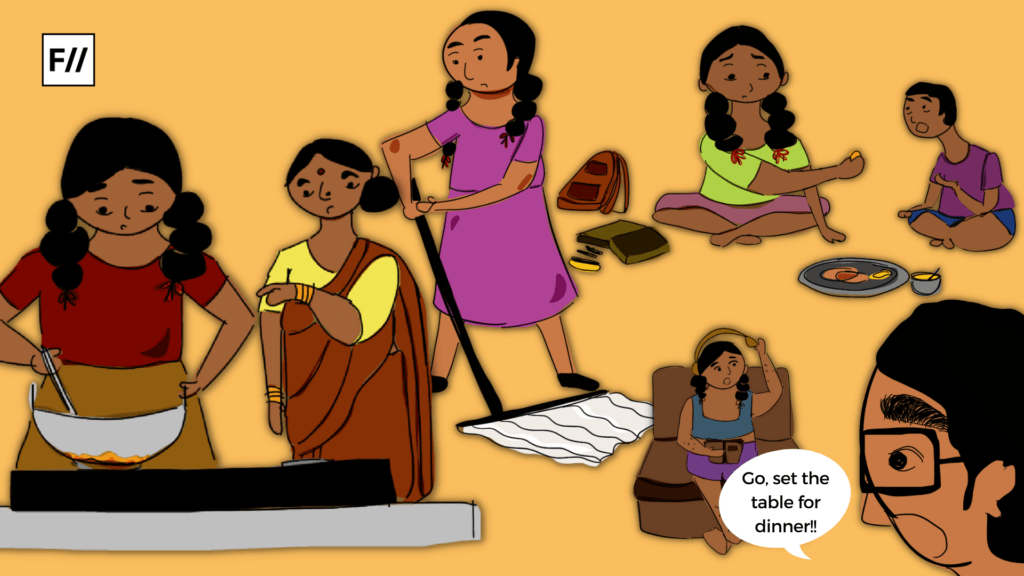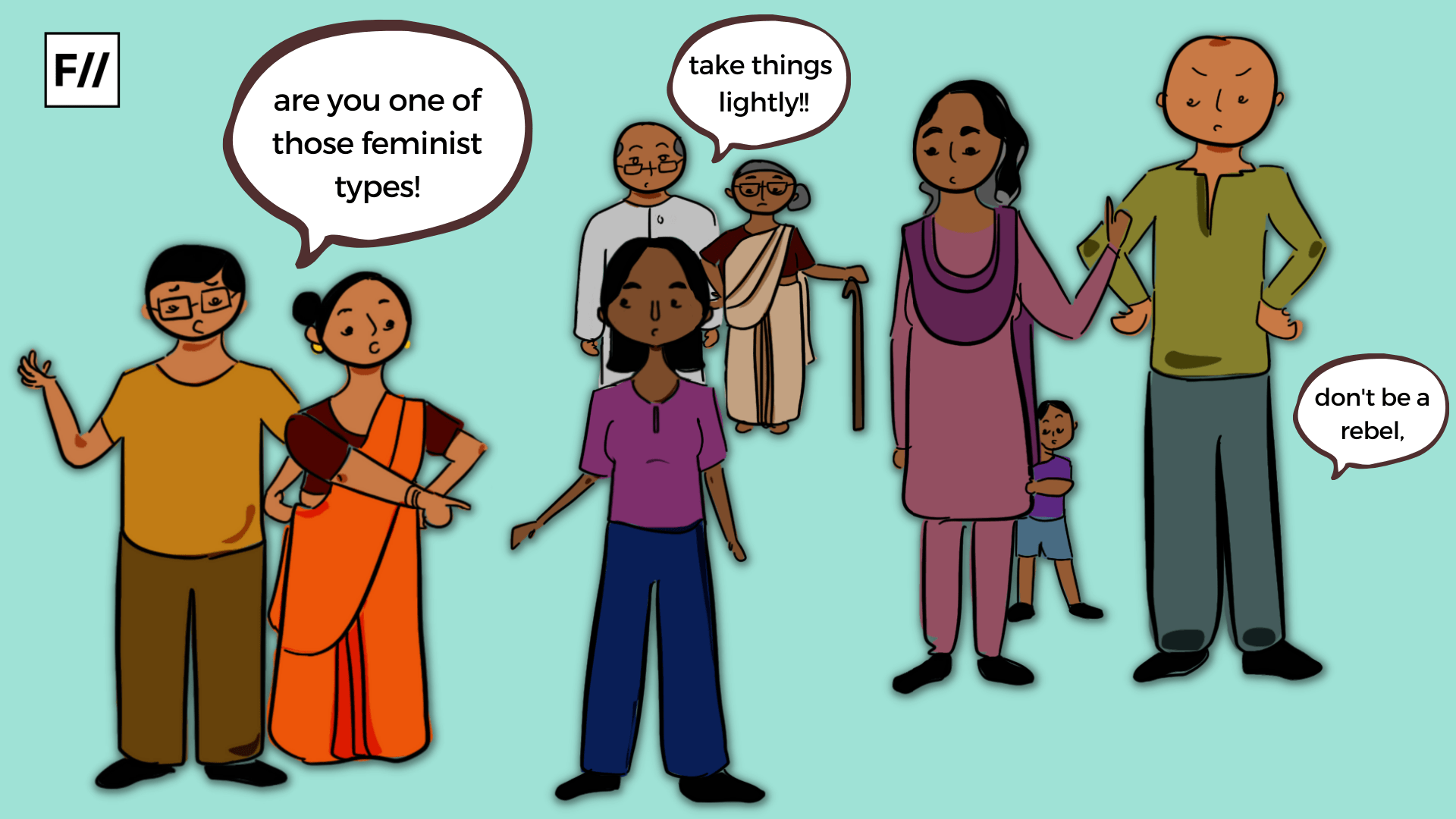Have you ever witnessed gender based violence, the practice of dowry, latent sexism, adherence to patriarchal traditions such as the husband treating his wife as an inferior person, taking control over her mobility, sexuality, reproduction and labour, within your family? Have you called this out or chosen not to create a storm?
Irrespective of what position a person holds in their professional or public life, many a times, we automatically prefer to button our lips up when it comes to critically engaging with family. There are many people who express their disagreements be it in their public or private lives. But there are also a few others who would like to question the problematic practices persisting in their families, but just don’t know how to.
Developmental feminist activist and author Kamla Bhasin in her book What is patriarchy, writes, “The family is also important for socialising the next generation in patriarchal values. It is within the family that we learn the first lessons in hierarchy, subordination, discrimination. Boys learn to assert and dominate, girls to submit, to expect unequal treatment. Again, although the extent and nature of male control may differ in different families, it is never absent.”
Being a ‘feminist killjoy‘ always wrecks havoc becuase you are attempting to address the elephant in the room, which everyone wishes to blissfully ignore for the continuance of what clearly is systemic oppression. However, it does get physically and emotionally taxing to have disputes with people you love, and to become the source of ‘distress and conflict’ within the family is exhausting

Family is among the prime socialising institutions, as well as one of the primary sites of gendering people in the society. Women are conditioned sub consciously to develop a certain amount of ‘tolerance’ in order to maintain ‘family peace’. To keep the functioning of the family intact, the members, especially women, continue to bare the brunt of gender-based violence, prefer to stay in emotionally, sexually and physically abusive relationships, and put up with discriminatory traditions and practices.
Author Madhuri Banerjee in her blog Why do women keep silent, writes, “A drunken partner is better than no partner at all. Being single is worse than being in a dead marriage. Be a good woman and look after your partner – feed him, clean his house, look after his needs, keep him happy. If you keep quiet, the abuse goes away. But let me tell you. It doesn’t. The abuse never goes away.” We are taught to maintain ‘family peace’ and we do not want things to get messy. Hence, we decide to just ‘let it go’.
Since family is one of the most fundamental institutions of the society, and a significant space where gendering and personality development takes place, it is important to reorganise and redistribute the power structure within it. How each individual deals with the impact may differ, and this process happens differently for different people. But there can be no ambiguity about the fact that the unequal gender power distribution within families must be questioned
Personally, I am an individual who is really vocal about such things in the public as well as private realms of life. However, often, I am not able to take a strong stand on certain issues within my extended family or kinship group, and when I do, I am labeled as ‘too preachy’. No matter how much one tries to ignore the feeling, being labeled does have a certain amount of psychological and mental impact, especially when it comes from people (family) who should have ideally provided you with a secure, safe and a non-judgemental space to express yourself and communicate freely.
The seeds of such thoughts are sown into our psyche very early on in life, and parents play a major role in moulding them. The Indian Express, in an article titled Chup raho, kam bolo, dheere bolo, published interviews with a few women who were oblivious to the fact that they have been systematically trained to not speak up.
“Priyanka, 22, has an MSc degree and remembers how her mother trained her to become silent. She says, ‘When I used to go to my friends’ homes I was already a quiet girl, but they were the opposite so my mom was, like, not liking their nature. She said you should be a bit sober.’ ‘Sober’ is a very Indian usage to indicate someone who is quiet, serious, unsmiling, walking a straight path and not getting into trouble. A sober girl is a safe girl, a marriageable, moral girl, whose very invisibility makes her culturally desirable. When girls persist in speaking, qualifiers are brought in. Girls are told, if you must speak, speak softly,” the article quotes.
Also read: The Institution Of Family: Assignment Of Gender Roles Begin At Home

Why is it important to speak up?
Being a ‘feminist killjoy‘ always wrecks havoc becuase you are attempting to address the elephant in the room, which everyone wishes to blissfully ignore for the continuance of what clearly is systemic oppression. However, it does get physically and emotionally taxing to have disputes with people you love, and to become the source of ‘distress and conflict’ within the family is exhausting.
Annalisa Barbieri in her blog titled ‘My family is casually sexist, but say they are entitled to their ‘opinions’’, published in The Guardian, elaborates on some key techniques one can use to navigate such conversations with family members. For instance, she writes, “The first thing to try to remember is that new/contradictory information presented in a gentler manner is more likely to “go in”. It’s really difficult, though, when the subject matter is so important and you feel so passionately about something. But if you want to change the way someone thinks, you just can’t go in all guns blazing, because it won’t alter anything – if you shout or preach (and I’m not saying you are) all people tend to notice is the method of delivery, not the information being imparted.”
Since family is one of the most fundamental institutions of the society, and a significant space where gendering and personality development takes place, it is important to reorganise and redistribute the power structure within it. How each individual deals with the impact may differ, and this process happens differently for different people. But there can be no ambiguity about the fact that the unequal gender power distribution within families must be questioned.
Also read: Feminism In A Sexist Household: Navigating Feminist Discourse With Conservative Parents
Featured Image Source: Ritika Banerjee for Feminism In India
About the author(s)
Ishita is a student of Political Science (Honors) at Kamla Nehru college, Delhi University. In the world of patriarchy, she is not someone who is afraid to voice out her beliefs and speak up for them. Though mostly cheerful and friendly she is very particular about her deadlines and perfection in her chores






